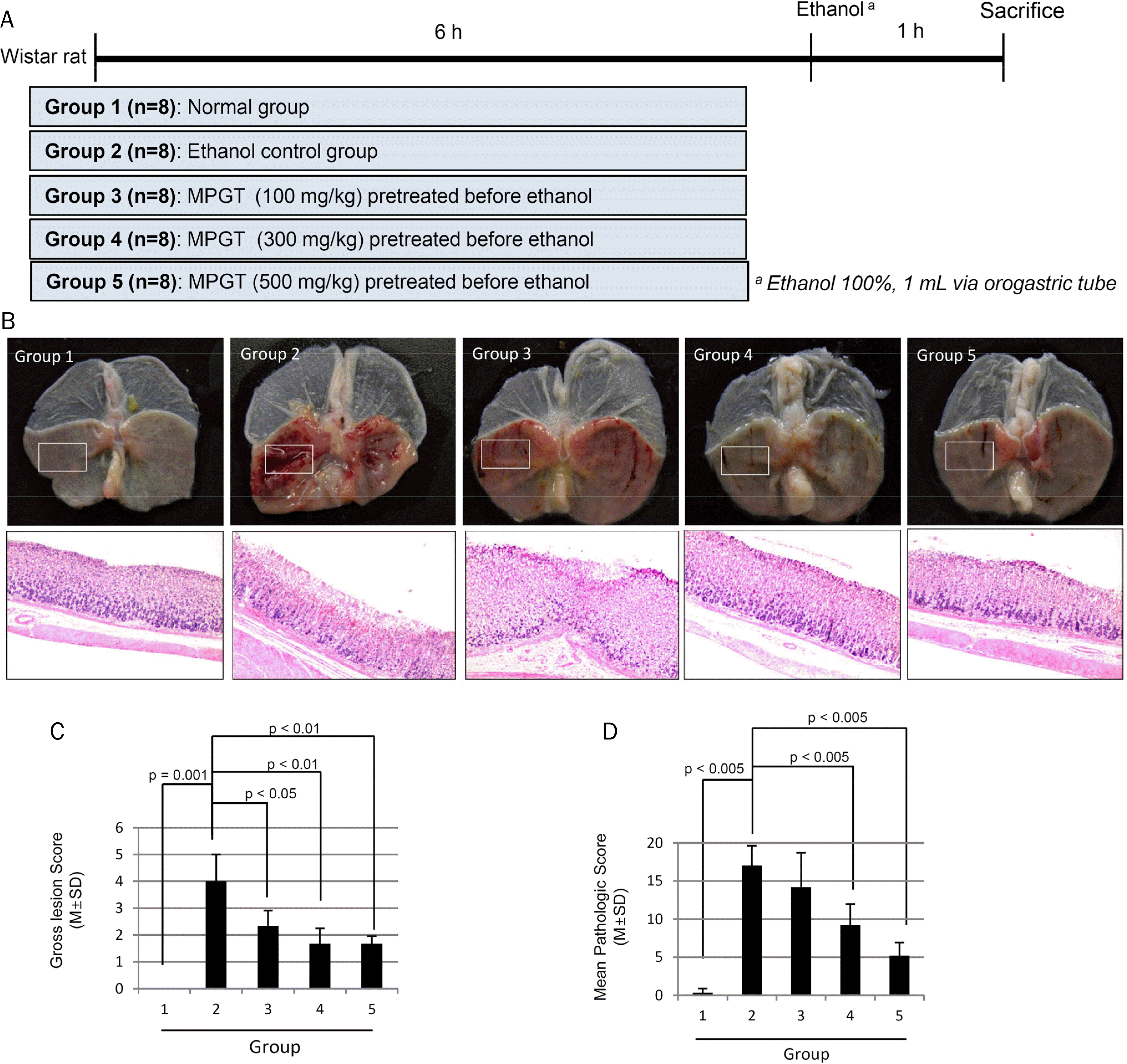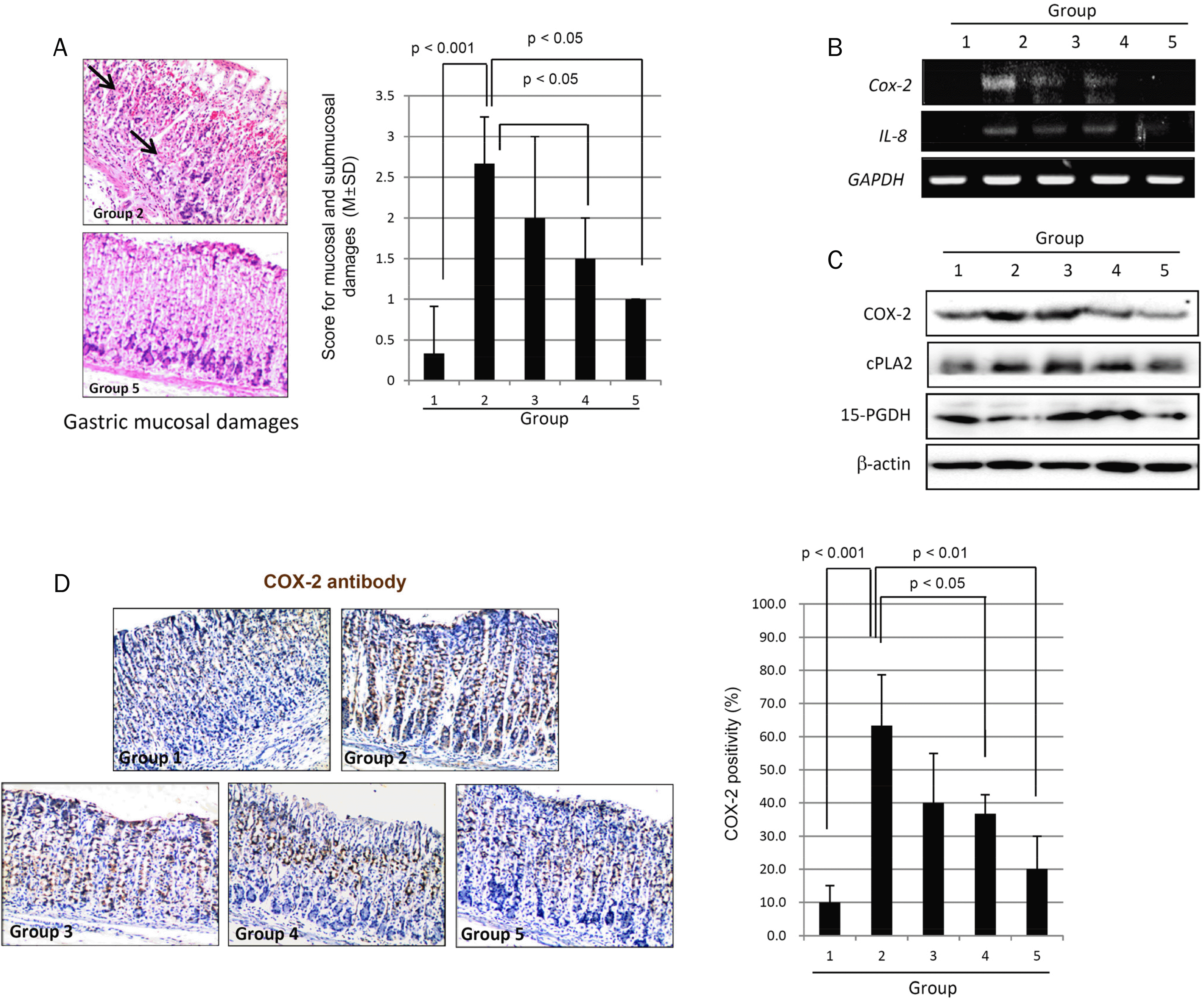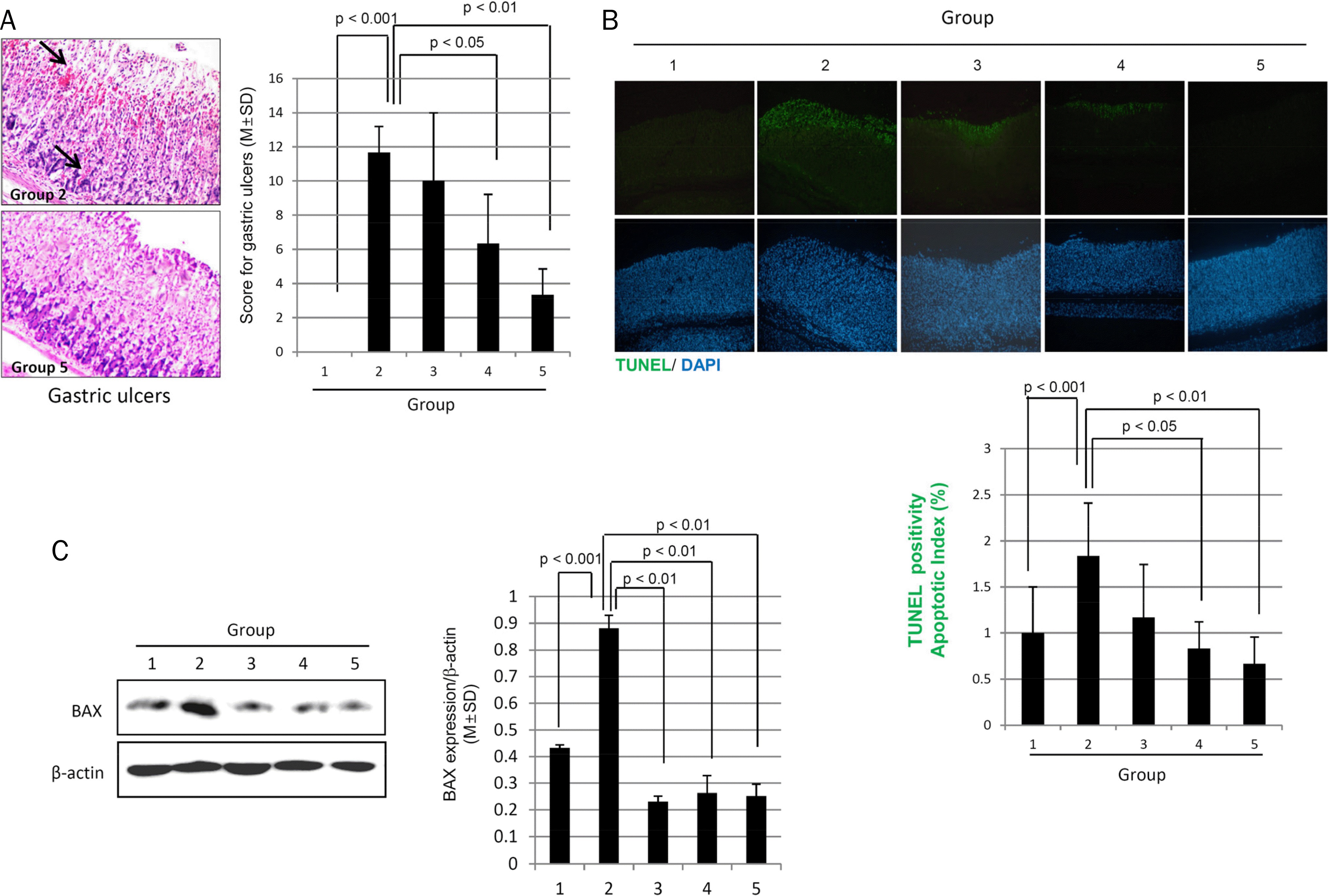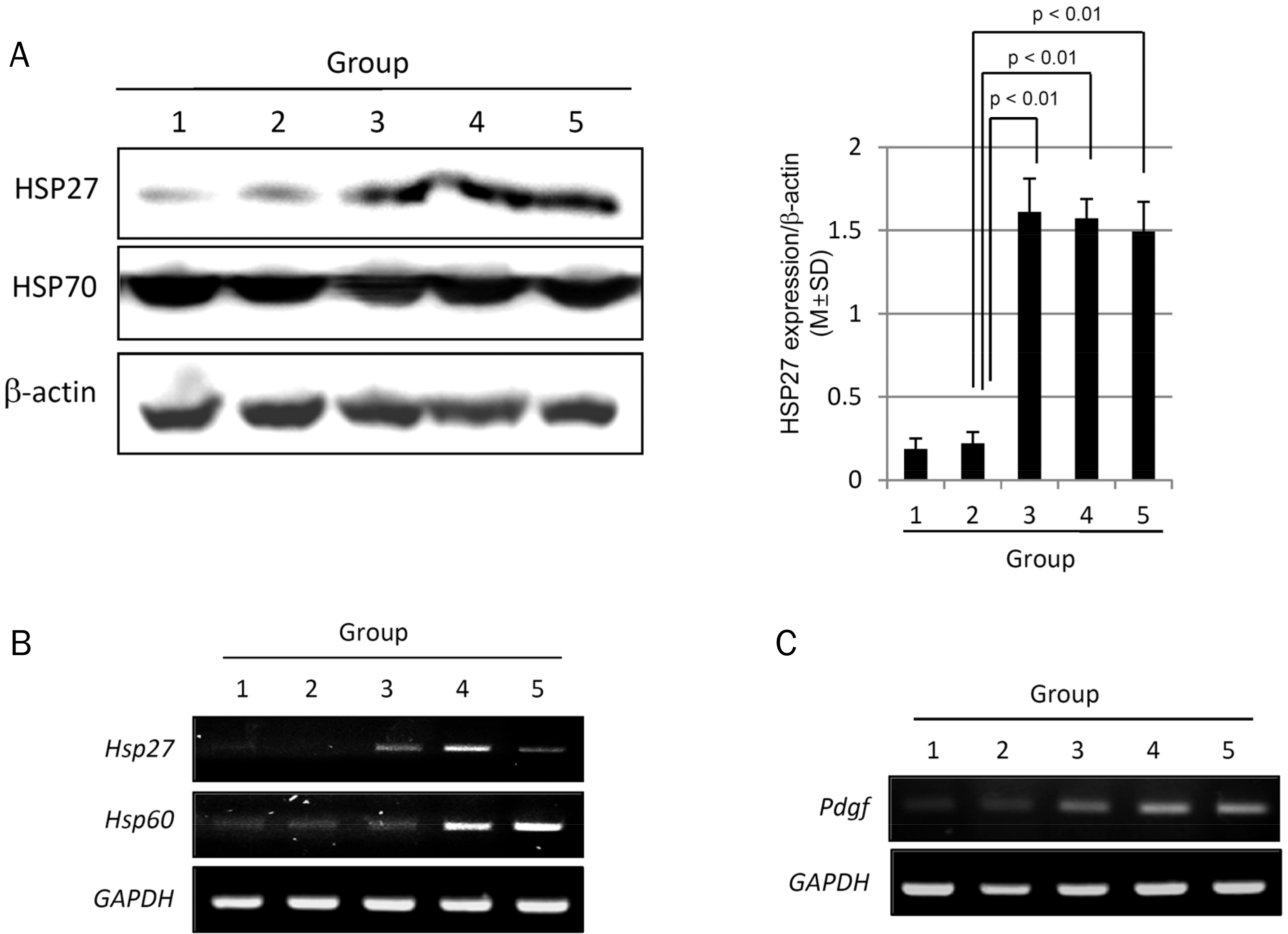Abstract
Background/Aims
Several lines of evidence from epidemiologic and laboratory studies have shown that the consumption of Artemisia or green tea extracts (MPGT) is inversely associated with the risk of alcohol-induced damage and other chronic diseases. Supported by previous studies showing that the combined extract of Artemisia and green tea, MPGT, exerted significantly either anti-oxidative or anti-inflammatory actions against Helicobacter pyloriassociated gastric diseases, it was hypothesized that MPGT can offer protection against alcoholic gastritis.
Methods
Ethanol was administered to induce gastric damage in Wistar rats, which had been pretreated with various doses of MPGT, to measure the rescuing action of a MPGT pretreatment against ethanol-induced gastric damage. In addition, the molecular mechanisms for the preventive effects were examined.
Results
The MPGT pretreatment (100, 300, and 500 mg/kg) alleviated the ethanol-induced gastric damage, which was evidenced by the significant decrease in calcium-dependent phospholipase A2, MAPKs, and NF- B levels compared to ethanol alone. Furthermore, the MPGT pretreatment preserved 15-prostaglandin dehydrogenase, whereas cyclooxygenase-2 was decreased significantly. All of these biochemical changes led to the significant alleviation of alcoholassociated gastric mucosal damage. Ethanol significantly increased the TUNEL positivity in the stomach, but MPGT decreased the apoptotic index significantly, which was associated with significantly lower pathological scores of ethanol-induced mucosal ulcerations. The significant protective changes observed alcoholic gastritis with MPGT were related to the increased expression of cytoprotective genes, such as heat-shock protein (HSP)27, HSP60, and PDGF.
References
1. Hernández-Muñoz R, Montiel-Ruíz C, Vázquez-Martínez O. Gastric mucosal cell proliferation in ethanol-induced chronic abdominal injury is related to oxidative stress and lipid peroxidation in rats. Lab Invest. 2000; 80:1161–1169.
2. Kwiecień S, Brzozowski T, Konturek SJ. Effects of reactive oxygen species action on gastric mucosa in various models of mucosal injury. J Physiol Pharmacol. 2002; 53:39–50.
3. Park SW, Oh TY, Kim YS, et al. Artemisia asiatica extracts protect against ethanol-induced injury in gastric mucosa of rats. J Gastroenterol Hepatol. 2008; 23:976–984.

4. Park JM, Hahm KB, Kwon SO, Kim EH. The anti-inflammatory abdominals of acidic polysaccharide from Artemisia capillaris on Helicobacter pylori infection. J Cancer Prev. 2013; 18:161–168.
5. Park JM, Han YM, Lee JS, et al. Nrf2-mediated mucoprotective and anti-inflammatory actions of Artemisia extracts led to at-tenuate stress related mucosal damages. J Clin Biochem Nutr. 2015; 56:132–142.
6. Kim YS, Lee HJ, Park JM, et al. Targeted molecular ablation of abdominal stem cells for curing gastrointestinal cancers. Expert Rev Gastroenterol Hepatol. 2017; 11:1059–1070.
7. Kuzuhara T, Suganuma M, Fujiki H. Green tea catechin as a chemical chaperone in cancer prevention. Cancer Lett. 2008; 261:12–20.

8. Jeong M, Park JM, Han YM, et al. Dietary intervention of artemisia and green tea extracts to rejuvenate Helicobacter pyloriassociated chronic atrophic gastritis and to prevent tumorigenesis. Helicobacter. 2016; 21:40–59.
9. Nam SY, Kim N, Lee CS, et al. Gastric mucosal protection via abdominal of MUC5AC and MUC6 by geranylgeranylacetone. Dig Dis Sci. 2005; 50:2110–2120.
10. Goo MJ, Ki MR, Lee HR, et al. Helicobacter pylori promotes abdominal fibrosis in the animal model. Lab Invest. 2009; 89:1291–1303.
11. Linkous A, Yazlovitskaya E. Cytosolic phospholipase A2 as a abdominal of disease pathogenesis. Cell Microbiol. 2010; 12:1369–1377.
12. Pandey R, Ghorpade A. Cytosolic phospholipase A2 regulates al-cohol-mediated astrocyte inflammatory responses in HIV-abdominal neurocognitive disorders. Cell Death Discov. 2015; 1:15045.

13. Kang GD, Lee SY, Jang SE, Han MJ, Kim DH. Irisolidone abdominal ethanol-induced gastric injury in mice by inhibiting the abdominal of neutrophils. Mol Nutr Food Res. 2017; 61.
14. Song HJ, Myung SJ, Kim IW, et al. 15-hydroxyprostaglandin abdominal is downregulated and exhibits tumor suppressor activity in gastric cancer. Cancer Invest. 2011; 29:257–265.
15. Jiang M, Gao PF, Li HQ, Tian PY, Fan XM. Ghrelin inhibition of abdominal-induced gastric epithelial cell apoptosis is mediated by miR-21. Int J Clin Exp Pathol. 2015; 8:4662–4672.
16. El-Maraghy SA, Rizk SM, Shahin NN. Gastroprotective effect of crocin in ethanol-induced gastric injury in rats. Chem Biol Interact. 2015; 229:26–35.

17. Antonisamy P, Subash-Babu P, Alshatwi AA, et al. Gastroprotective effect of nymphayol isolated from Nymphaea stellata (Willd.) flowers: contribution of antioxidant, anti-inflammatory and anti-apoptotic activities. Chem Biol Interact. 2014; 224:157–163.

18. Rozza AL, Meira de Faria F, Souza Brito AR, Pellizzon CH. The abdominal effect of menthol: involvement of anti-apoptotic, antioxidant and anti-inflammatory activities. PLoS One. 2014; 9:e86686.
19. Luiz-Ferreira A, Cola M, Barbastefano V, et al. Healing, abdominal and cytoprotective properties of indigofera truxillensis in different models of gastric ulcer in rats. Int J Mol Sci. 2012; 13:14973–14991.
20. Saika M, Ueyama T, Senba E. Expression of immediate early genes, HSP70, and COX-2 mRNAs in rat stomach following abdominal ingestion. Dig Dis Sci. 2000; 45:2455–2462.
21. Lee JS, Oh TY, Kim YK, et al. Protective effects of green tea poly-phenol extracts against ethanol-induced gastric mucosal damages in rats: stress-responsive transcription factors and MAP abdominal as potential targets. Mutat Res. 2005; 579:214–224.
22. Ozbayer C, Kurt H, Ozdemir Z, et al. Gastroprotective, abdominal and antioxidant effects of oleum cinnamomi on ethanol induced damage. Cytotechnology. 2014; 66:431–441.
23. Al Batran R, Al-Bayaty F, Jamil Al-Obaidi MM, et al. In vivo abdominal and antiulcer activity of Parkia speciosa ethanolic leaf extract against ethanol-induced gastric ulcer in rats. PLoS One. 2013; 8:e64751.
24. Ibrahim IA, Qader SW, Abdulla MA, Nimir AR, Abdelwahab SI, Al-Bayaty FH. Effects of Pithecellobium jiringa ethanol extract against ethanol-induced gastric mucosal injuries in Sprague-Dawley rats. Molecules. 2012; 17:2796–2811.

25. Ibrahim IA, Abdulla MA, Hajrezaie M, et al. The gastroprotective effects of hydroalcoholic extract of Monolluma quadrangula against ethanol-induced gastric mucosal injuries in Sprague Dawley rats. Drug Des Devel Ther. 2016; 10:93–105.

26. Lee HJ, Ock CY, Kim SJ, Hahm KB. Heat shock protein: hard work-er or bad offender for gastric diseases. Int J Proteomics. 2010; 2010:259163.

27. Choi SR, Lee SA, Kim YJ, Ok CY, Lee HJ, Hahm KB. Role of heat shock proteins in gastric inflammation and ulcer healing. J Physiol Pharmacol. 2009; 60(Suppl 7):5–17.
28. Yeo M, Park HK, Kim DK, et al. Restoration of heat shock protein70 suppresses gastric mucosal inducible nitric oxide abdominal expression induced by Helicobacter pylori. Proteomics. 2004; 4:3335–3342.
29. Mayer MP, Bukau B. Hsp70 chaperones: cellular functions and molecular mechanism. Cell Mol Life Sci. 2005; 62:670–684.

31. Hellström PM, Hendolin P, Kaihovaara P, et al. Slow-release L-cys-teine capsule prevents gastric mucosa exposure to carcinogenic acetaldehyde: results of a randomised single-blinded, abdominal study of Helicobacterassociated atrophic gastritis. Scand J Gastroenterol. 2017; 52:230–237.
32. Lee HJ, Park JM, Han YM, et al. The role of chronic inflammation in the development of gastrointestinal cancers: reviewing cancer prevention with natural anti-inflammatory intervention. Expert Rev Gastroenterol Hepatol. 2016; 10:129–139.

Fig. 1.
MPGT pretreatment alleviated ethanol-induced gastric damage. (A) Experimental scheme. Five animal groups were set: Group 2 as the control and Groups 3, 4, and 5 pretreated with 100 mg/kg, 300 mg/kg, and 500 mg/kg MPGT. The rats were sacrificed after 1 hour of 100% ethanol. Representative pictures of the gross appearance of the rat stomach after alcohol ingestion in the absence or presence of 100, 300, and 500 mg/kg MPGT pretreatment. (B) Gross and microscopic photograph of ethanol-induced gastric mucosal lesions according to the group, ×40 magnification. (C, D) The scoring criteria are written in Methods. The mean score for the gross and pathologic lesion scores. The mean levels of the gross lesion index and mean scores of pathological evaluation are presented as the mean±SD from 8 rats/group. MPGT, extracts of artemisia and green tea; SD, standard deviation.

Fig. 2.
Status of ethanol-induced gastric inflammation. (A) Mean score for inflammation according to group. (B) Changes in IL-8, phosphate ERK, phosphate JNK, and phosphate p38 mRNA and their protein expression. (C) Immunohistochemistry staining with the NF-κ B p65 anti-body, ×100 magnification, and the mean positivity according to the group. ERK, extracellular signal-regulated kinases; JNK, c-Jun N-terminal kinases; mRNA, messenger RNA; SD, standard deviation.

Fig. 3.
Status of ethanol-induced mucosal and submucosal damage. (A) Score of mucosal and submucosal damage. Pathology image representing the mucosal and submucosal condition from Groups 2 and 5 ×100 magnification. (B) Western blot for cPLA2 and 15-PGDH (C) RT-PCR and Western blot for COX-2 according group (left) (D) Immunohistochemical staining with COX-2 antibody (middle), ×100 magnification, and mean COX-2 positivity. cPLA2, calcium-dependent phospholipase A2; COX-2, cyclooxygenase-2; ERK, extracellular signal-regulated kinases; JNK, c-Jun N-terminal kinases, SD, standard deviation.

Fig. 4.
Status of an ethanol-induced gastric ulcer. (A) Mean score for ethanol-induced gastric ulcers. The arrow shows the significant denudation and exfoliation of gastric mucosa. (B) TUNEL staining for apoptotic cells. All images were obtained from the non-ulcerated mucosa of each group and significantly increased TUNEL positive cells were noted in Group 2 even in the non-ulcerated gastric mucosa. (C) Mean TUNEL positive (apoptotic index) according to the group. (D) Western blot for BAX expression. TUNEL, terminal deoxynucleotidyl transferase mediated dUTP nick-end labeling; SD, standard deviation.

Fig. 5.
Western blot for HSP27 and HSP. (A) Changes in HSP27 and HSP70 according to group. (B) Changes in Hsp27 and Hsp70 mRNA by RT-PCT. (C) Changes in Pdgf mRNA by RT-PCR. HSP, heat-shock protein; mRNA, messenger RNA; SD, standard deviation.

Table 1.
Determination of the Score in H. pylori– Induced Inflammation and Ulcers




 PDF
PDF ePub
ePub Citation
Citation Print
Print


 XML Download
XML Download